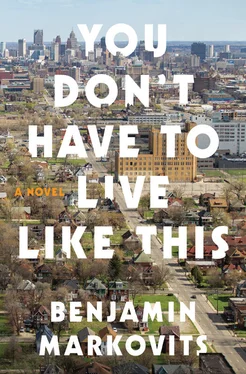But maybe a half hour later I was talking to Robert in the living room, and my hands started feeling sticky. I touched my forehead but couldn’t tell if it was burning or freezing.
“Thanks,” Robert said.
“For what?”
He thought for a minute. When he couldn’t think of the right word or phrase he usually waited until it came to him. “For holding the line.”
“I didn’t know there was a line.”
“Okay.”
We stood there awkwardly; my head felt floaty, not quite right. “I’ve been meaning to ask you,” I said. “What’s in this for you?”
“What do you mean?”
“The whole thing. All of this. Two years of your life.”
“You know, in my circle right now, when we get together, a lot of us talk about real estate. The people I hang out with buy real estate. They complain about the prices, they brag about their deals, they act like it’s the only topic of conversation. And I sometimes think what they don’t realize is that it really is the only topic of conversation. I still rent our apartment in New York. None of this means to me what it means to other people. But I travel a lot, I see what it means. I was in Rio two weeks ago, and the people who invited me took me on one of these favela tours. You know, meet the natives. And I asked some guy, do you rent or own? And he kind of looked at me, and he said, when I needed a house, I built a house. When my father built his house, there was still land to build on, but now there isn’t any land, so I built on top of his. But you should see these houses. Two rooms. There are no gardens. The only private space for someone with a family is on the roof. So people take showers on the roof, they snack, they sit around. You can see it all from the funicular. It goes right overhead.”
“I don’t understand why you’re telling me this.”
“In some of these places I travel, there isn’t a woman over the age of twenty that you or I would consider sexually attractive. I’m serious about this, Marny. People talk a lot about Brazilian women, but in poor countries the only women we would consider attractive are young women. It costs money to stay attractive. I’m not even talking about cosmetic surgery. But diet, gym, free time, clothes, all of it costs money. In New York I see a lot of very attractive forty-five-year-old women. But not one in the favelas. And it occurred to me that what’s really going on here is an inside-outside thing. A woman needs privacy to look good. She has to say to herself, I’m going out to face the world, and that means having somewhere to prepare herself. It’s a question of real estate.”
“The reason New York women look good is because they go to the gym, and the reason they go to the gym is they live in shit holes.”
“That’s not why. You don’t know these women — they live alone. This is a very recent thing. We have this whole idea of presenting ourselves that comes from having a room of our own. In poor countries, everybody eats together, everybody sleeps together, everybody lives in the street. But we build houses to go inside, which is fine, but then we have to deal with going out again.”
“Where do you get this shit, Robert? Nathan Zwecker? You think it’s only rich people who get neuroses? Everything you read about poverty tells you that it’s basically symbiotic with mental illness. They go hand in hand.”
“That’s what I mean. If you solve the real estate problem, you solve everything else.”
“You’re not making sense, but that’s not what I asked you anyway.”
I felt a fever coming on and wanted this conversation to stop. My head seemed to be the only thing staying still. There were bright spotlights in Tony’s living room, which made the ceiling swell and shift in its plane. The ground wasn’t too steady either. Robert thought I was waiting for him to say something.
“When I was at Yale,” he said, “all I wanted to do is make money. And then when I was twenty-eight years old, I made a lot of money. I never wanted to spend it, though, that’s not how I was brought up. I wanted to win. That’s how I was brought up. But then you’re twenty-eight years old, and you think, what do I do now? It took me a long time to recover.”
“So what happens next?”
“That’s partly what I want to talk to you about. I think it’s a good idea you take a break for while. Maybe go back home.”
“What do you mean?”
“I mean back to Baton Rouge.”
“Are you kicking me out? Did people vote on this?”
“Marny, I just think it’s a good idea. I’m worried. I don’t know what happens next. I don’t want you caught up in it.”
“Something’s not right. I don’t feel right. I can’t feel anything.”
“Maybe you should sit down. It’s been a long week.”
“No, I can’t feel anything,” I said. “I can’t feel my face.”
Cris came down from putting the kids to bed and took my temperature. It was raised, but not especially high — maybe 101. But she made Tony take me to the hospital.
“I don’t want to go,” I said. “People will recognize me there.”
“What are you talking about?”
“I’m in the news.”
“Just hold an ice pack to your face. No one will look at you.”
And eventually I let them put me in the car. My health insurance was only valid for the DMC, so Tony had to drive me into Detroit — against the rush hour mostly, but it still took an hour. He was drunk; he didn’t want to get pulled over. There was a three-car pileup on I-94, and we didn’t make it to the exit in time. Vehicles with sirens kept pushing past us on the hard shoulder. But we got off at last and he dropped me outside the emergency unit and went to park. There was a big green space opposite, with people drinking outside, under the trees. The weather was changing. The cold air had a spring smell instead of a winter smell. You could see stars and clouds, the street lamps were lit.
I wandered through the automatic doors. There was a reception desk, but it wasn’t the right one, and eventually I found the right one. The woman behind the desk had a tear tattooed on her cheek and chunky rings on her fingers. She could type very quickly, clicking the whole time, and told me to take a seat. About fifteen minutes later Tony found me, and then we sat there waiting maybe another hour. It was a busy night.
The chairs were these plastic chairs, but you couldn’t move them, and they were spaced to make it difficult to lie down. So people kept fidgeting — all kinds of people. Big floor-to-ceiling windows at one end looked onto a hospital corridor with kids’ pictures on the wall — you could tell they were kids’ pictures from the bright colors. At one point I stood up to take a closer look. Art from the leukemia unit. The waiting room itself was a kind of public/private space. People talked on their cell phones. They bought snacks from the snack machine and spread out the food like a picnic. There was a kiddie corner with plastic toys, including several of those sit-down cars you have to push along, but the kids kept pushing them outside the gated area, which was a problem, because many people waiting had canes or crutches or some kind of motion aid, including wheelchairs.
People went out to smoke and came back in. Some of the time you could tell what they were waiting for, but not always. I saw a lot of preexisting conditions: guys with splints or stitches or substantial bandaging. Pregnant women. Crying kids, black eyes, bloody noses. Burn victims. I had the usual thoughts you get in a hospital, like, would you have sex with this species? The answer is generally no. From time to time the receptionist read out a name, or a couple of names, and people shuffled up to the desk. Then a nurse came to take them away.
Читать дальше












